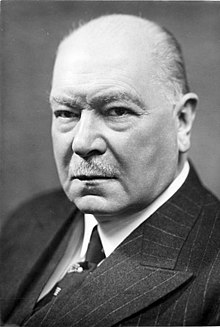Julius Dorpmüller

Julius Heinrich Dorpmueller (24 July 1869 in Elberfeld - 5 July 1945 in Malente) was general manager of Deutsche Reichsbahn-Gesellschaft from 1926–45 and the German Reich Transport Minister from 1937-45.
Life
Dorpmueller was the son of a railway engineer, and studied railway and road construction from 1889 to 1893. After graduating in 1898, Dorpmueller was active in the Prussian state railway administration. In 1907 he stepped down as an executive of the technical office and went into the service of the Schantung railway in Tsingtao. In 1908 he was appointed chief engineer for the German section of the new Chinese Imperial state Tianjin-Pukou railway. Due to the declaration of war by China against the German Reich, he returned as a refugee in 1918, passing through Manchuria, Siberia and Russia to Germany. In the light railway service he was active in the management of the Transcaucasian SFSR railways. In 1919 he became departmental head with German Reich Railways (Deutsche Reichseisenbahnen) in the Stettin district. From 1922 to 30 September 1924 he was a president in the Deutsche Reichseisenbahnen in the Oppeln district, and from 1 October 1924 to 1925 he was president in the Ruhr district; due to his comprehensive experience in light railways, Dorpmueller was consulted as part of the Dawes plan.
After 1925 the Board of Directors of the German Reich Railway (Deutsche Reichsbahn Gesellschaft) created a position entitled Permanent Representative of the General Manager (Head of the Railway), as General Manager Rudolf Oeser was seriously ill; Dorpmueller was appointed to this post on 3 July 1925. In December 1925 RWTH Aachen, in acknowledgment of his services to railways awarded him a doctorate in engineering. On 3 June 1926, the day of Rudolf Oeser's death he was selected by the Board of Directors to become the German railway's General Manager. Due to political considerations it was only confirmed on 18 October 1926 by the President of Germany.
On 2 February 1937 Dorpmueller became the Reich Transport Minister. On 11 July 1939 the "law concerning the Deutsche Reichsbahn" (German Reich Railway) was issued and Dorpmüller was confirmed as transport minister and also General Manager of the Deutsche Reichsbahn. On 20 January 1943, Heinrich Himmler sent a letter to Dorpmüller on the subject of the Holocaust trains, in support of the Final solution: "need your help and support. If I am to wind things up quickly, I MUST HAVE MORE TRAINS."[1]
Dorpmüller stayed in post until the formation of the 1945 Flensburg government. The British then asked Dorpmueller to take over reconstruction of the German railways: Dorpmueller and his representative Albert Ganzenmueller were brought by air, by the United States, to Chesnay in Paris, in order to meet for negotiations over the reorganization of German transport. The American general Carl Gray had expressly recommended Dorpmueller to General Dwight D Eisenhower for "re-instatement to his old office", because he - as also "our secret service confirms" - had been neither a "Nazi sympathizer nor activist". With difficulty, as he was suffering from cancer, Dorpmueller returned on 13 June 1945 to Malente and from there, gave advice on reconstruction. On 23 June 1945 he was operated on - again - but his digestive system no longer functioned, so his health deteriorated rapidly. Despite this, he led official discussions, in full coherence, until two days before his death.
Dorpmueller died on 5 July 1945 and was buried in Malente.
After his death
In accordance with an October 1949 letter from Lübeck's denazification main committee to Maria Dorpmueller, Julius's sister, he was said to have obtained "relief" under category V classification. In the honours lists of the Aachen university 1995 anniversary publication, he was listed as an honorary doctor (1925) and an honorary senator (1939), with no further details. In the Nuremberg transport museum and in the "Dorpmueller Hall" of the main station of Hanover there were busts of Dorpmueller, until 1985, when they were removed during preparations for celebration of the sesquicentenary of the introduction of railways to Germany. In the Essen railway's head office there was once a "Dorpmueller room", which was renamed in 1985 to "Small meeting room"; the bust there also disappeared. Roads in the cities Wuppertal, Minden and Hameln, were originally named after Dorpmuller and have also been renamed.
In September 1994, someone from Ratingen, complained to German railways about Dorpmueller's "badly-maintained" grave. In a letter from them in response in January 1995, they said that the former BD Hamburg had maintained the grave until the end of 1991, a decision by the former executive committee of the German Federal Railroads meant there was no more provision for maintenance thereafter. In the middle of 1995, someone from Hamburg tidied-up the grave and took over care at their own expense.[citation needed]
Honors and medals
- 1925 Honorary Doctorate of Engineering, University of Aachen
- 1934 Golden medal of the Prussian Academy for Construction
- 1939 Eagle Shield of the German Reich
- Knights Cross of the War Merit Cross (Twice: one with Swords and one without Swords)
